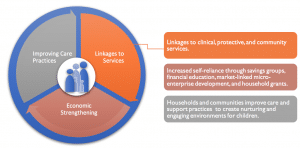PROGRAM COMPLETED: IMPROVING SERVICES FOR VULNERABLE POPULATIONS
2016 – 2020
FXB Rwanda completed a program to build the capacity of highly vulnerable families in the districts of Musanze and Burera.
Context
Rwanda is still affected by the 1994 genocide, during which nearly one million Tutsis were massacred. The democratically elected Rwandan Patriotic Front gradually restored order, security and then civil service and ensured the stability of the country.
Rwanda was one of the few countries that had been able to achieve most of the United Nations Millennium Development Goals. Substantial progress has been made in poverty reduction, education and HIV prevention.
Despite these successes, Rwanda is still a poor country, ranked 160th out of 189 by the latest UNDP Human Development Index in 2020. It faces significant development challenges. Chronic malnutrition, poor infrastructure, lack of access to electricity, early childhood development, child mortality, the quality of education, and the prevention of violence against children all require sustained attention.
FXB in action
The programme uses a family-centered approach to strengthen the capacity of households to improve their economic conditions through internal savings and credit groups, financial education and microenterprise development.
It also aims to reduce health-related vulnerabilities through interventions such as early childhood development, nutrition, water, hygiene and sanitation, health education, and the development of linkages between health care and communities.

Impact
The five-year project, known locally as Twiyubake, was funded by USAID/PEPFAR and implemented by Global Communities and six Rwandan partners, including FXB Rwanda.
Implemented in 12 districts between 2016 and 2020, it has enabled 50,000 vulnerable families – 250,000 children, youth, and adults – to significantly reduce their vulnerabilities.
